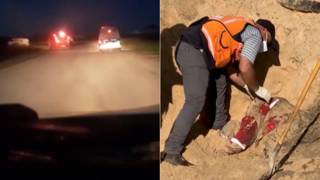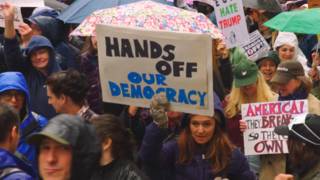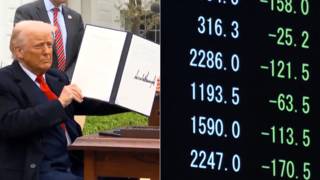HeadlinesJune 26, 2008
US Attacks Kill 8 Iraqis, Including Family
At least eight Iraqi civilians have been killed in separate attacks from US forces. On Wednesday, a family of five died when a US helicopter struck their home in Tikrit. Both parents were killed along with their three children all under ten years old. Another five people were injured in a neighboring home. Also Wednesday, three Iraqi bank workers were killed when US forces shot their car near Baghdad’s airport. Meanwhile, at least seven civilians were injured when a car bomb exploded in central Baghdad.
Witness: “We were sitting inside the shop, when we saw fire. The people who were sitting inside the shop were wounded and taken to the hospital. A number of vehicles were wrecked, and glass was strewn everywhere.”
Bush Hosts Iraqi President for Talks on Long-Term Deal
Meanwhile, at the White House, President Bush hosted Iraqi President Jalal Talabani amidst ongoing talks on a status of forces agreement between Iraq and the United States. Bush said the two sides are making progress.
President Bush: “We talked a variety of subjects. We talked about a strategic framework agreement that suits the Iraqi government. We talked about elections and different laws that have been passed. I did compliment the President on working hard to see to it that the legislative session this year has been very successful. We talked about the fact that the economy is improving and that the attitude of the people there has improved immeasurably over the years.”
Earlier this month, Iraqi Prime Minister Nouri al-Maliki warned the talks had reached a dead end over several US demands. The Bush administration is seeking to keep more than fifty military bases in Iraq. It’s also insisting on continuing military campaigns without consultation with the Iraqi government and immunity for American soldiers and contractors.
Supreme Court Cuts Exxon Damages for Alaska Oil Spill
The Supreme Court has sharply reduced the amount of money Exxon Mobil has to pay in punitive damages for the 1989 Exxon Valdez oil spill in Alaska. An Alaskan jury had initially ruled Exxon should pay $5 billion in punitive damages for the accident that spilled 11 million gallons of crude oil into the fishing waters of Prince William Sound. Punitive damages were cut in half in 2006. On Wednesday, the Supreme Court cut the amount of punitive damages again and ordered Exxon Mobil to pay just $500 million — one-tenth of the original jury’s ruling. We’ll have more on this story after headlines.
Justices End Executions for Child Rape
In another ruling, the Supreme Court struck down the death penalty for raping a child. In a five-to-four judgment, justices said prisoners can only be executed for murder or crimes against the state. The ruling overturns laws in six states, including Louisiana, where two men have been on death row after being convicted of child rape.
Internal Probe Faults Security Gaps at US Nuclear Sites
A leaked US Air Force review has found major security flaws at most US bases storing nuclear weapons in Europe. The probe was launched after an incident last August in which a B-52 bomber inadvertently carried nuclear warheads on a cross-country flight. According to the report, security infrastructure is in need of major repair at several sites. At some bases, nuclear weapons were found to be guarded by private security guards and US soldiers with just months of experience. The report calls for reducing the number of nuclear weapons in Europe to “reduce vulnerabilities at overseas locations.” The report was leaked to the Federation of American Scientists and published on its website. Hans Kristensen of the Federation of American Scientists said, “The main implication of the…report is that the nuclear weapons deployment in Europe is, and has been for the past decade, a security risk.”
Amnesty International Erects Gitmo Cell on National Mall
In Washington, human rights activists with Amnesty International have erected a replica of a Guantánamo Bay prison cell on the National Mall. Zeke Johnson of the group Counter Terror with Justice said in addition to closing Guantánamo, government officials should be held accountable for authorizing torture.
Zeke Johnson: “Part of Amnesty International’s campaign is calling for an end to torture and other cruel and inhuman and degrading treatment in the context of the fight against terrorism. So we want torture to end and for people who authorized and implemented it to be held accountable.”
The action comes ahead of a House hearing today on interrogation practices at Guantánamo. Vice President Cheney’s chief of staff David Addington and former Justice Department lawyer John Yoo are among those expected to testify. Today is also the World Day in Support of Victims of Torture.
Canadian Judge: US Treatment of Khadr Amounts to Torture
Meanwhile, a Canadian judge has issued a harsh rebuke of the US imprisonment of the Canadian prisoner Omar Khadr. On Wednesday, federal court judge Richard Mosley said Khadr’s treatment has violated international laws against torture. Mosley cited a document detailing a technique used against Khadr during his interrogation. Mosley did not reveal the technique but said it should be publicly exposed. Khadr was fifteen years old when he was arrested by US troops in Afghanistan.
Judge: NSA Not Compelled to Disclose Spying on Gitmo Attorneys
In other Guantánamo news, a federal judge has rejected a suit that would have forced the National Security Agency to disclose whether it spied on the lawyers of Guantánamo prisoners. On Wednesday, US District Judge Denise Cote said the NSA does not need to tell lawyers whether they were spied on. Attorneys have claimed they’ve avoided international phone calls out of fear their phones are tapped.
Senate Begins Debate on FISA Bill
On Capitol Hill, the Senate has voted to begin debate on a measure that would rewrite the nation’s surveillance laws and grant immunity to phone companies involved in President Bush’s secret domestic spy program. The legislation gives the government new powers to eavesdrop on both domestic and international communications. The Democratic-controlled House approved its version of the bill last week.
Obama, Clinton to Hold Joint Rally
On the campaign trail, Senator Barack Obama and Senator Hillary Clinton are set to hold their first joint appearance today since Obama won the Democratic nomination earlier this month. Obama has reportedly asked top donors to help Clinton retire more than $10 million in campaign debt. On Wednesday, Obama said he would welcome Clinton’s aid during the campaign.
Sen. Barack Obama: “I think we can send Senator Clinton anywhere, and she’ll be effective. So, obviously it’ll be constrained by her schedule, but I’m looking forward to campaigning vigorously with her. I think we will have a terrific time together in New Hampshire, and I think that she will be very effective all the way through November.”
South Koreans Protest as US Beef Imports Set to Resume
In South Korea, thousands of people continued to rally in the capital Seoul Wednesday ahead of today’s expected move to resume importing US beef.
Protester: “Obviously the president is not listening to us. He made his nationally televised apology, but after the apology he’s forcing to implement the deal. I can only think he’s not listening at all.”
South Korea imposed the ban five years ago after an outbreak of mad cow disease. But the ban was lifted last month after US lawmakers threatened to withhold a pending trade deal.
Mandela Criticizes Mugabe on Political Crisis
Former South African President Nelson Mandela has ended a public silence on the crisis in Zimbabwe. On Wednesday, Mandela criticized Zimbabwe President Robert Mugabe for what he called a “tragic failure of leadership.”
Nelson Mandela: “Nearer to home, we had seen the outbreak of violence against fellow Africans in our own country and the tragic failure of leadership in our
neighboring Zimbabwe.”
Mandela was speaking in London at a dinner ahead of his ninetieth birthday next month. Mugabe has come under widespread criticism for refusing to cancel a runoff election scheduled for Friday. Opposition leader Morgan Tsvangirai won the first round of elections in March but withdrew from the runoff late last week. He has sought refuge in the Dutch embassy in Harare out of what he says is concern for his life. On Wednesday, Tsvangirai said Mugabe has declared a war.
Morgan Tsvangirai: “Well, where does this leave the country? At a dead end. Let me say that it’s not an election. If he goes into a process of an election [inaudible], it’s not an election. That’s what we keep on saying, that this is not an election. It is war. Mugabe has declared war, and we don’t want to be part of it.”
Cuba Approves Lung Cancer Vaccine
In Cuba, health officials have approved what’s believed to be the world’s first registered vaccine for lung cancer. Doctors say the treatment, CimaVax EGF, can extend survival rates by an average four to five months, and in some cases longer. The vaccine is said to have few side effects because it attacks only cancer cells.
US Mayors Call for Shunning Bottled Water
Back in the United States, the US Conference of Mayors has approved a resolution calling for the phasing out of bottled water. The measure calls on cities to cancel bottled-water contracts and redirect taxpayer dollars to other resources. Each day an estimated 60 million plastic water bottles are thrown away. Most are not recycled. The Pacific Institute has estimated 20 million barrels of oil are used each year to make the plastic for water bottles.
Intelligence Estimate Warns on Global Warming
In environmental news, a new high-level US intelligence review has concluded global warming will endanger US operations abroad. In a new report, the National Intelligence Council says the effects of climate change have the “potential to seriously affect US national security interests.”
Florida, Sugar Corp. Reach Everglades Deal
And in Florida, state officials have reached a deal to purchase large swaths of land in the Everglades. Under the agreement, Florida will pay the US Sugar Corporation $1.7 billion for 300 square miles of land.
Most popular
- 1
- 2
- 3
- 4
Non-commercial news needs your support
Please do your part today.











Media Options